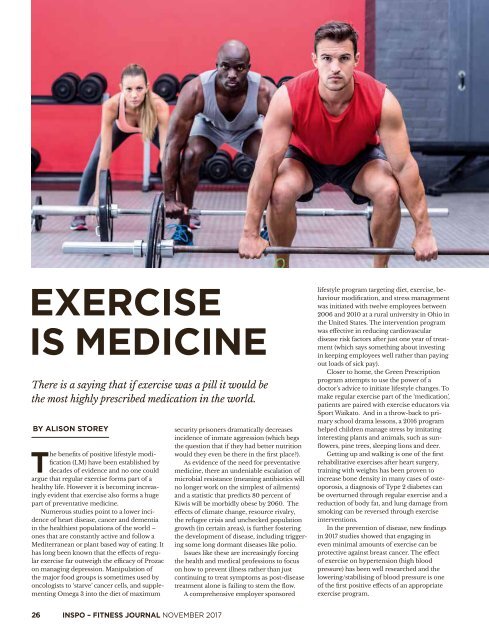INSPO Fitness Journal November 2017
Everything from nutrition, beauty, home and workplace wellbeing to health, performance – and so much more.
Everything from nutrition, beauty, home and workplace wellbeing to health, performance – and so much more.
You also want an ePaper? Increase the reach of your titles
YUMPU automatically turns print PDFs into web optimized ePapers that Google loves.
EXERCISE<br />
IS MEDICINE<br />
There is a saying that if exercise was a pill it would be<br />
the most highly prescribed medication in the world.<br />
BY ALISON STOREY<br />
The benefits of positive lifestyle modification<br />
(LM) have been established by<br />
decades of evidence and no one could<br />
argue that regular exercise forms part of a<br />
healthy life. However it is becoming increasingly<br />
evident that exercise also forms a huge<br />
part of preventative medicine.<br />
Numerous studies point to a lower incidence<br />
of heart disease, cancer and dementia<br />
in the healthiest populations of the world –<br />
ones that are constantly active and follow a<br />
Mediterranean or plant based way of eating. It<br />
has long been known that the effects of regular<br />
exercise far outweigh the efficacy of Prozac<br />
on managing depression. Manipulation of<br />
the major food groups is sometimes used by<br />
oncologists to ‘starve’ cancer cells, and supplementing<br />
Omega 3 into the diet of maximum<br />
security prisoners dramatically decreases<br />
incidence of inmate aggression (which begs<br />
the question that if they had better nutrition<br />
would they even be there in the first place?).<br />
As evidence of the need for preventative<br />
medicine, there an undeniable escalation of<br />
microbial resistance (meaning antibiotics will<br />
no longer work on the simplest of ailments)<br />
and a statistic that predicts 80 percent of<br />
Kiwis will be morbidly obese by 2060. The<br />
effects of climate change, resource rivalry,<br />
the refugee crisis and unchecked population<br />
growth (in certain areas), is further fostering<br />
the development of disease, including triggering<br />
some long dormant diseases like polio.<br />
Issues like these are increasingly forcing<br />
the health and medical professions to focus<br />
on how to prevent illness rather than just<br />
continuing to treat symptoms as post-disease<br />
treatment alone is failing to stem the flow.<br />
A comprehensive employer sponsored<br />
lifestyle program targeting diet, exercise, behaviour<br />
modification, and stress management<br />
was initiated with twelve employees between<br />
2006 and 2010 at a rural university in Ohio in<br />
the United States. The intervention program<br />
was effective in reducing cardiovascular<br />
disease risk factors after just one year of treatment<br />
(which says something about investing<br />
in keeping employees well rather than paying<br />
out loads of sick pay).<br />
Closer to home, the Green Prescription<br />
program attempts to use the power of a<br />
doctor’s advice to initiate lifestyle changes. To<br />
make regular exercise part of the ‘medication’,<br />
patients are paired with exercise educators via<br />
Sport Waikato. And in a throw-back to primary<br />
school drama lessons, a 2016 program<br />
helped children manage stress by imitating<br />
interesting plants and animals, such as sunflowers,<br />
pine trees, sleeping lions and deer.<br />
Getting up and walking is one of the first<br />
rehabilitative exercises after heart surgery,<br />
training with weights has been proven to<br />
increase bone density in many cases of osteoporosis,<br />
a diagnosis of Type 2 diabetes can<br />
be overturned through regular exercise and a<br />
reduction of body fat, and lung damage from<br />
smoking can be reversed through exercise<br />
interventions.<br />
In the prevention of disease, new findings<br />
in <strong>2017</strong> studies showed that engaging in<br />
even minimal amounts of exercise can be<br />
protective against breast cancer. The effect<br />
of exercise on hypertension (high blood<br />
pressure) has been well researched and the<br />
lowering/stabilising of blood pressure is one<br />
of the first positive effects of an appropriate<br />
exercise program.<br />
26 <strong>INSPO</strong> – FITNESS JOURNAL NOVEMBER <strong>2017</strong>


















